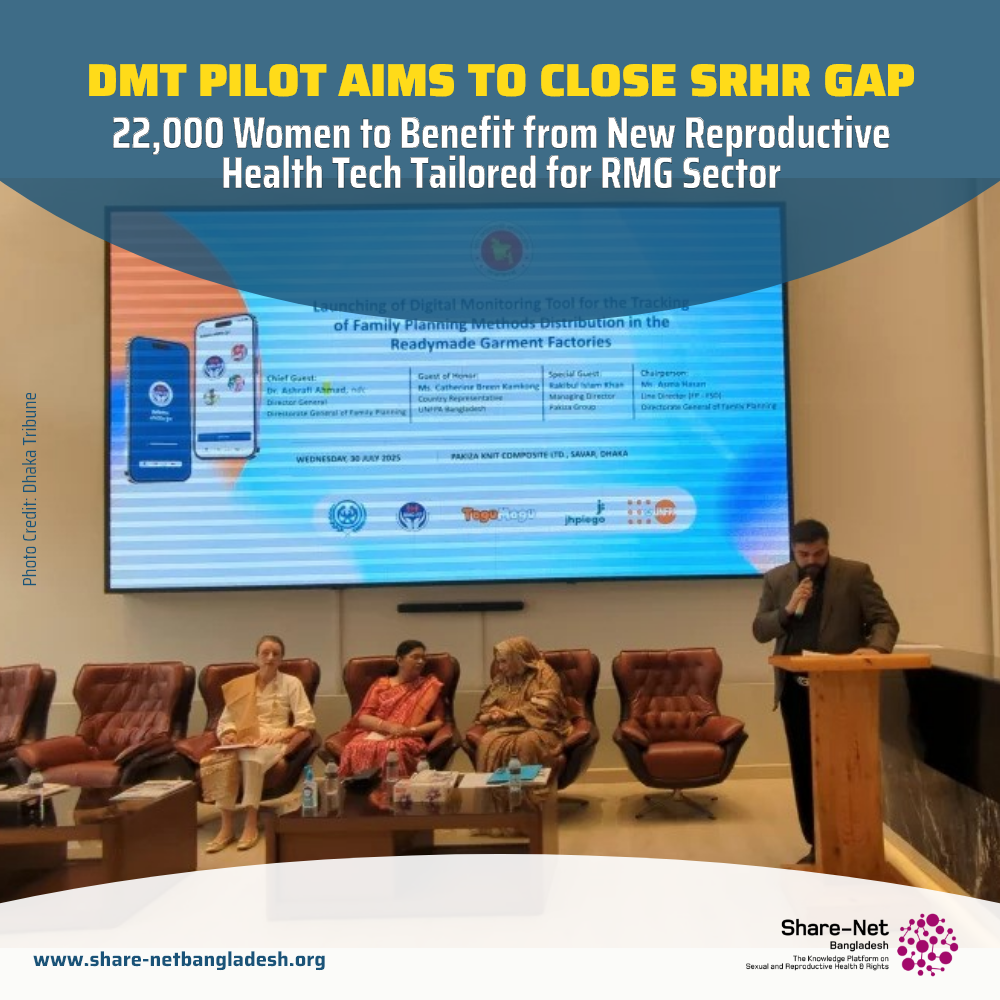DMT Pilot Aims to Close SRHR Gap: 22,000 Women to Benefit from New Reproductive Health Tech Tailored for RMG Sector
In Bangladesh’s garment sector, over 2.4 million women keep the machines running—yet in the past nine years, only a fraction, about 804,000, have received contraceptives through workplace programmes.
But now, this scenario has changed. Now, a simple beep on a mobile screen could soon mean the difference between missed doses and timely care for thousands of women in Bangladesh’s garment sector. Recently, a Digital Monitoring Tool (DMT) was launched at PAKIZA Knit Composite Ltd, aiming to bring smarter, more accessible, and accountable family planning services directly to female garment workers.
Jointly developed by the Directorate General of Family Planning (DGFP), UNFPA, and private sector partners, the DMT will initially reach over 22,000 women in six factories, starting with 7,600 women accessing family planning services. For Bangladesh’s garment sector—home to nearly 4 million workers, over 60% women—this marks a potentially transformative moment for sexual and reproductive health rights (SRHR).
How the Tool Works
The DMT is a dual-platform system that tracks contraceptive supplies, service delivery, and performance in real time. Once registered with an ID number, a worker receives automated reminders before her contraceptives run out, along with her next collection date.
During the launch, a female worker received a packet of contraceptives as the distribution was instantly logged into the system—showcasing how paper-based records could soon be a thing of the past.
“This innovation is about more than technology. It’s about ensuring workers’ SRH rights are fulfilled and that they are supported in their workplaces,” said Catherine Breen Kamkong, UNFPA’s representative in Bangladesh.
The Bigger Picture: Linking Health to Productivity
Access to family planning in Bangladesh’s factories remains limited. A UNFPA study found that investing in such services can boost productivity by up to 20% and reduce absenteeism by 26%, potentially saving each factory $160,000 annually.
Yet, in the last nine years, only 804,000 female workers received contraceptives—a fraction of the total workforce. The DMT aims to close this gap, ensuring more women can make informed choices about their reproductive health without losing work hours.
Private-Public Collaboration for SRHR
The pilot is part of a broader health strategy by DGFP and UNFPA, including cervical cancer screening and gender-based violence survivor support. Private partners like Togumogu Private Ltd and Jhpiego helped design the platform, ensuring it’s scalable for national rollout.
Factory owners, too, see the economic and ethical value.
“Healthy workers mean stronger productivity, which is why we’ve joined this initiative,” said Rakibul Islam Khan, Managing Director of PAKIZA Knit Composite Ltd.
From Pilot to Policy
Over the six-month pilot, feedback will shape refinements before the tool’s potential expansion nationwide. If successful, it could set a global example for integrating digital health into workplace welfare systems.
The real question is—can such innovations create a cultural shift where workplace SRHR is treated as a right, not a privilege? For Bangladesh’s garment sector, the DMT could be the start of a new chapter in worker welfare—one where health, rights, and productivity grow together.
Source: Dhaka Tribune

